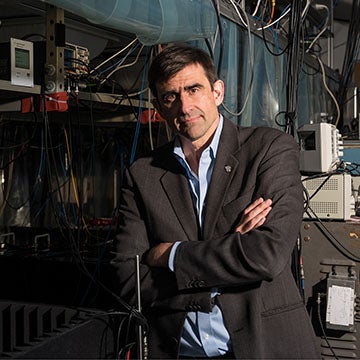Dear members of the Natural Sciences community,
My first exposure to real science was an undergraduate research experience, measuring the millimeter-wave absorption spectra of reactive hydrocarbon molecules in a gas discharge. This might sound esoteric, but these spectral features provided fingerprints that could be observed in radio emissions from space, allowing collaborators at radio telescopes to discern the chemistry of the interstellar medium. The ultimate question was whether the chemical building blocks for life could have originated in deep space.

I learned that fundamental scientific discovery can answer profound questions and satisfy the human need to explore and understand our place in the universe. As my career progressed, I also saw how basic research provided the essential foundation for transformative, often unforeseen technological advances that enhance our prosperity and quality of life. In my area of research, studies of clouds of atoms cooled to temperatures near absolute zero have opened the door to quantum technologies that enable precision timekeeping and hold promise for advanced computing and environmental sensing.
Many of us have similar stories, and I am confident that all of us share this belief in the fundamental value of science.
It is a belief based on fact. Scientific research saves lives, such as the development of vaccines, which protect us from scourges like polio and enabled the eradication of smallpox, a disease that once claimed an estimated 5 million lives a year. It has led to the technological marvels of modern society, such as the invention of the transistor, which ushered in the digital age. Great intellectual achievements also uplift and inspire all of us, such as mapping the human genome, observing planets being born around distant stars or returning to the Moon.
The engine of scientific discovery is the research university. Most of the discoveries mentioned above, along with inventions like MRI imaging, the internet, lithium-ion batteries, smartphones, Google, and many, many more got their start from professors and students working together in university research programs.
Federal funding, through agencies like the National Science Foundation, National Institutes of Health, Department of Energy, Department of Defense and others, is essential to maintain fundamental research. It is widely acknowledged that the partnership between the federal government and American research universities has been essential for the country’s economic growth and security since the end of the Second World War when this framework was established. This ecosystem of innovation is the envy of the world and is the reason why the United States has attracted generations of talented students and scientists and engineers that have enriched our country.
It is evident that science is critical to society and we live in a golden age of discovery, and yet, the scientific enterprise is under attack.
With seemingly little concern for the damage being done and what is at stake, we are witnessing disruptions in current federal grants, threats to drastically cut support for essential indirect costs of research, and indiscriminate firing of valuable civil servants or other actions to cripple critical federal funding agencies like the National Science Foundation and National Oceanic and Atmospheric Administration. A strong nation must be a leader in science and technology, and these moves undermine our future prosperity and security. What took generations to build can quickly be lost.
Equally damaging are attacks on programs intended to improve access and success in the sciences. Science is for everyone. This reflects that science is critical to the well-being of all of society and that we are committed to opening more paths for careers in science. In order to address the great challenges we face and explore the mysteries of the natural world, we need to attract talented people of all backgrounds. We must strengthen the pipeline into STEM fields for everyone, including members of traditionally underrepresented groups. The work of science is inherently interdisciplinary and complex, and we can accomplish more with contributions from people with a wide range of perspectives and experiences. The commitment of Rice University and the Wiess School of Natural Sciences to this work is unwavering.
At a time when science and higher education are facing increasing political challenges, civic engagement has never been more important. As scholars, researchers and educators, we have a responsibility to advocate for the critical role that science plays in society and to make amazing scientific advances understandable to everyone. Now more than ever, we must stand together in support of science and education.
Thank you for your commitment to our community and to the broader mission of scientific inquiry and education.
- Tom Killian
Dean, Wiess School of Natural Sciences
For more on Dean Killian's perspectives on the future of science and education, read this recent Rice News feature: Rice’s Killian calls for sustained research funding: ‘A strong nation must be a leader in science’.
